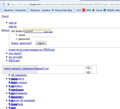
Once a security exception is confirmed, website will not load images.
I try to go to www.target.com and have problems loading some of their website for example. I have confirmed a security exception for https://www-secure.target.com/ (I suspect this is the reason I needed to confirm a security exception.) Firefox then allows me to load the website now that the exception is confirmed. However, once the page loads, no images and only basic text with links is visible. I have tried re-installing firefox. Removing cookies. Clearing history. I still receive the same error.
Please help!
Opaite Mbohovái (7)
I have also attached an image below of what appears when I try to visit target.com now.
It shouldn't be necessary to add an exception for www-secure.target.com
The New Guest link on the http://www.target.com works fine for me. In can you use the secure https://www.target.com then try the http: version as this server doesn't seem to have the correct certificate installed.
You can open the Web Console (Firefox/Tools > Web Developer) and check on the Network tab if any content is blocked and has a file size 0 (zero).
You can reload web page(s) and bypass the cache to refresh possibly outdated or corrupted files.
- Hold down the Shift key and left-click the Reload button
- Press "Ctrl + F5" or press "Ctrl + Shift + R" (Windows,Linux)
- Press "Command + Shift + R" (Mac)
Note that you should be cautious when you get an 'untrusted' error message and that you should never create a permanent exception in cases like this without investigating the cause.
Best would be to remove this exception and tell us what is wrong with the certificate.
- Tools > Options > Advanced > Certificates/Encryption: View Certificates
Check out why the site is untrusted and click "Technical Details to expand this section.
If the certificate is not trusted because no issuer chain was provided (sec_error_unknown_issuer) then see if you can install this intermediate certificate from another source.
You can retrieve the certificate and check details like who issued certificates and expiration dates of certificates.
- Click the link at the bottom of the error page: "I Understand the Risks"
Let Firefox retrieve the certificate: "Add Exception" -> "Get Certificate".
- Click the "View..." button and inspect the certificate and check who is the issuer of the certificate.
You can see more Details like intermediate certificates that are used in the Details pane.
If "I Understand the Risks" is missing then this page may be opened in an (i)frame and in that case try the right-click context menu and use "This Frame: Open Frame in New Tab".
- Note that some firewalls monitor (secure) connections and that programs like Sendori or FiddlerRoot can intercept connections and send their own certificate instead of the website's certificate.
- Note that it is not recommended to add a permanent exception in cases like this, so only use it to inspect the certificate.
Hello - thank you for the quick reply! I removed the exception and this is what I see for the technical details:
www-secure.target.com uses an invalid security certificate. The certificate is not trusted because no issuer chain was provided. (Error code: sec_error_unknown_issuer)
How do I install this intermediate certificate from another source as you mentioned above?
If you expand the last section of the error page and open the Add Exception dialog and view the certificate, what issuer is listed?
Moambuepyre
It appears to be my company name (on a company laptop). I've attached a screen shot.
I just checked a few more sites. Anything I navigate to that requires "https" I have this exact problem with.
Also - as I was looking for a solution I came across this response:
https://support.mozilla.org/en-US/questions/927787
The last response fixed my problem with amazon.com when using https
Are you using a company VPN or proxy server? That could explain why your secure connections are intercepted and that "fake" certificate is presented. Usually your IT would be able to give you the steps to import the necessary certificate to trust the proxy.



